Stay out of trouble: how to avoid copyright infringement with t-shirts

Think you can go ahead and start selling Micky Mouse t-shirts? Na-a-ah! Think again. Get permission from the copyright holder first… unless you fancy jail.
But, in all seriousness, there are many things to consider when you start a t-shirt business. And, one of those things is copyright infringement.
What is and isn’t allowed to put on a t-shirt?
This article will answer that question for you and give you a thorough breakdown of t-shirt design copyright laws. So, keep on reading.
What’s copyright infringement & why does it matter?
Before we get into copyright rules and copyright infringement, let’s first define or explain what copyright means.
So, what’s copyright?
The Merriam-Webster dictionary defines copyright (noun) as:
The exclusive legal right to reproduce, publish, sell, or distribute the matter and form of something (such as literary, musical, or artistic work).
In other words, copyright is a form of intellectual property law.
For instance, if your t-shirt business is registered in the US, then the copyright law of the United States will grant you protection for original works of authorship.
The following creative works of authorship can be copyrighted:
- Architectural
- Musical
- Literary
- Sound recordings
- Graphic
- Choreographic
- Sculptural
- Dramatic
- Pictorial
- Film
- Audiovisual
Now, what does copyright infringement mean?
Infringement refers to copyrighted material being reproduced, distributed, or used without the exclusive permission of the owner or author.
To put it in simple terms, the free use of somebody else’s work can be considered copyright infringement (unless it exists in the public domain or the copyright owner has granted full permission).
So, why is copyright infringement something that you need to be aware of as an online business owner selling t-shirts?
Well, for starters, forewarned is forearmed—awareness of t-shirt copyright laws will help you avoid copyright infringement.
Let’s say that you’ve somehow used a design that is copyrighted. What happens when the copyright holder uses reverse image search and finds out?
If you’re lucky, you’ll only get takedown notices. But, if you’re not, then the worst that will happen is that you might have to pay a penalty or a fine.
And, of course, something like this could have some serious legal consequences for your business:
A ruined reputation as a creator as well as possible imprisonment, especially if the copyright holder takes you to court.
So, it would be in your best interest to avoid copyright infringement entirely.
The do’s & don’ts of t-shirt copyright infringement
To help you avoid copyright infringement, let’s go through some do’s and don’ts of running a t-shirt printing business.
Be careful with cartoon characters on t-shirts
You’ve probably seen stores on different marketplaces that sell t-shirts with Disney characters. Does that mean you can go ahead and sell Mickey Mouse t-shirts?
Well, not exactly—a quick Google search will tell you that Mickey Mouse is trademarked material, and so is every other Disney character.
But, does that mean you cannot sell anything with Disney characters at all? There are some ways around it.
One way to legally use Disney characters is to seek permission from Disney Enterprises, Inc. by contacting them through their official website. If Disney gives you permission to use their characters, you will be required to enter into a licensing agreement.
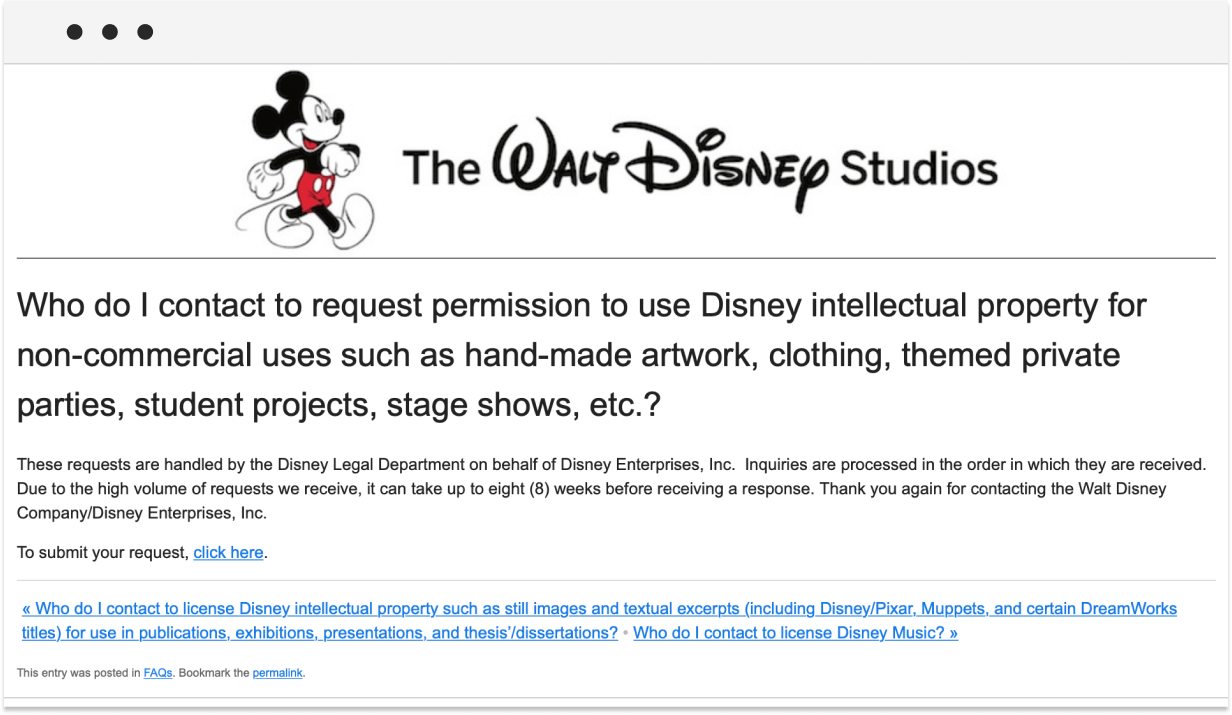
Another way to use Disney characters is by making changes to the design so that they no longer resemble the original images. This is called fair or transformative use in the United States copyright law.
What about other cartoon characters? It’s pretty much the same thing. But, the safest way to find out is to read the information on the company’s website and then request permission.
What about the commercial use of royalty-free images?
Wondering if you can use royalty-free images on t-shirts? The short answer is yes, but some of them may require giving credit to the owner if you want to use them for commercial purposes.
Let me explain:
It’s a simple yes if the images are under the public domain, but if the images are from a photo site, then you may have to give credit to the owner.

What is the public domain? The public domain has all kinds of content that fall under copyright law.
Although not part of the US Copyright Act, here’s a brief summary of what is considered to be public domain work:
- Expired copyright protection—in the US as well as many other countries, the duration of copyright protection is normally 70 years after the creator’s death.
- No sufficient originality—for example, lists from public documents often do not have sufficient originality to be eligible for copyright protection.
- No copyright notice—currently, in the US and Berne Convention countries, there’s no requirement for works to include a copyright notice.
- Not fixed in a tangible form—creative work that hasn’t previously been recorded or written isn’t protected by copyright.
And, last but not least, works produced or created by the US government are also considered to be under the public domain.

Think twice before printing your favorite Darth Vader quote
Can you sell t-shirts with movie quotes? The answer to this question is a little complicated because it depends on a few factors.
As mentioned earlier, only work that isn’t fixed in a tangible form can be commercially used.
And, most movie quotes (such as quotes from the Star Wars franchise) have been put down in writing, which means that you cannot use them as they’re protected by copyright law.
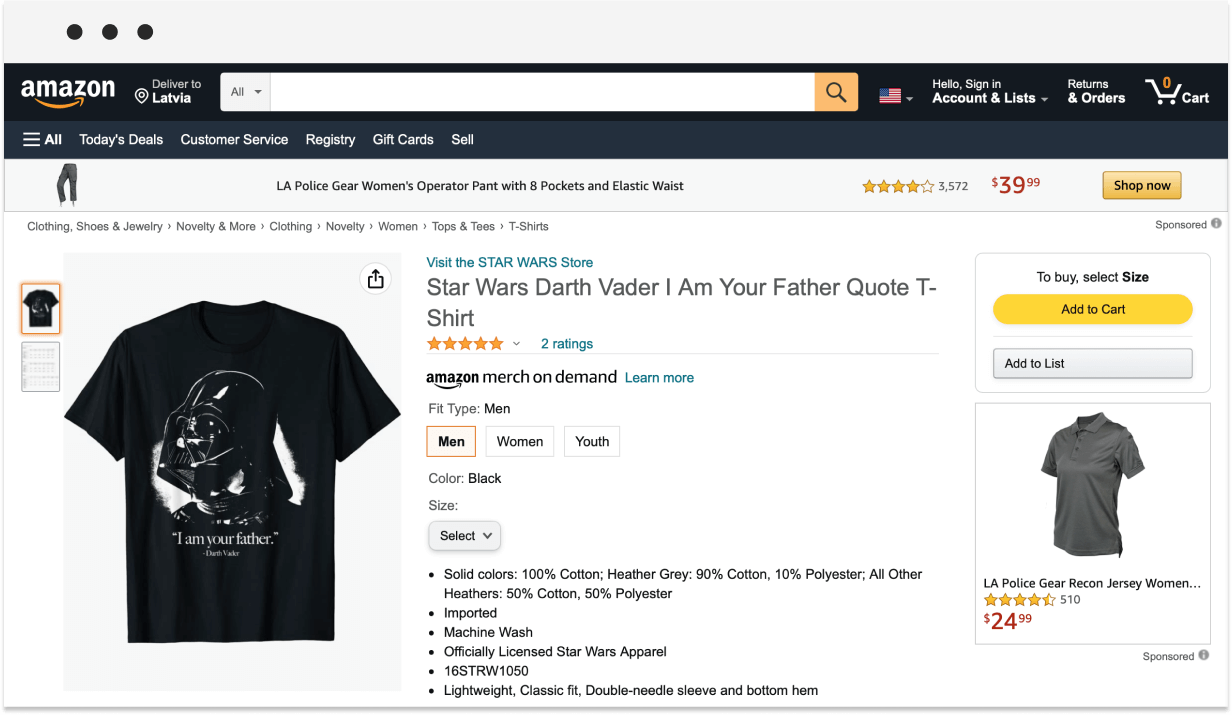
However, it’s always best to double-check and verify because, sometimes, certain quotes can be in the public domain. For example, quotes with expired copyright periods.
But, either way, it’s probably best to avoid using movie quotes altogether.
Steer clear of putting branded logos on t-shirts
What about putting a logo on a t-shirt and selling it? Well, this one is a straight-up no—you shouldn’t put a logo on a shirt and sell it.
Here’s why:
More often than not, logos are trademarked. Even if a logo isn’t (or you’re unsure whether it is), that still doesn’t mean you’re in the clear because most logos belong to a registered business, brand, or company. So, only the owner is allowed to use it.
You can, however, put a logo produced by the government on a t-shirt, or a custom logo—a logo that has been designed specifically for you, or one that you have paid for and own the rights to.
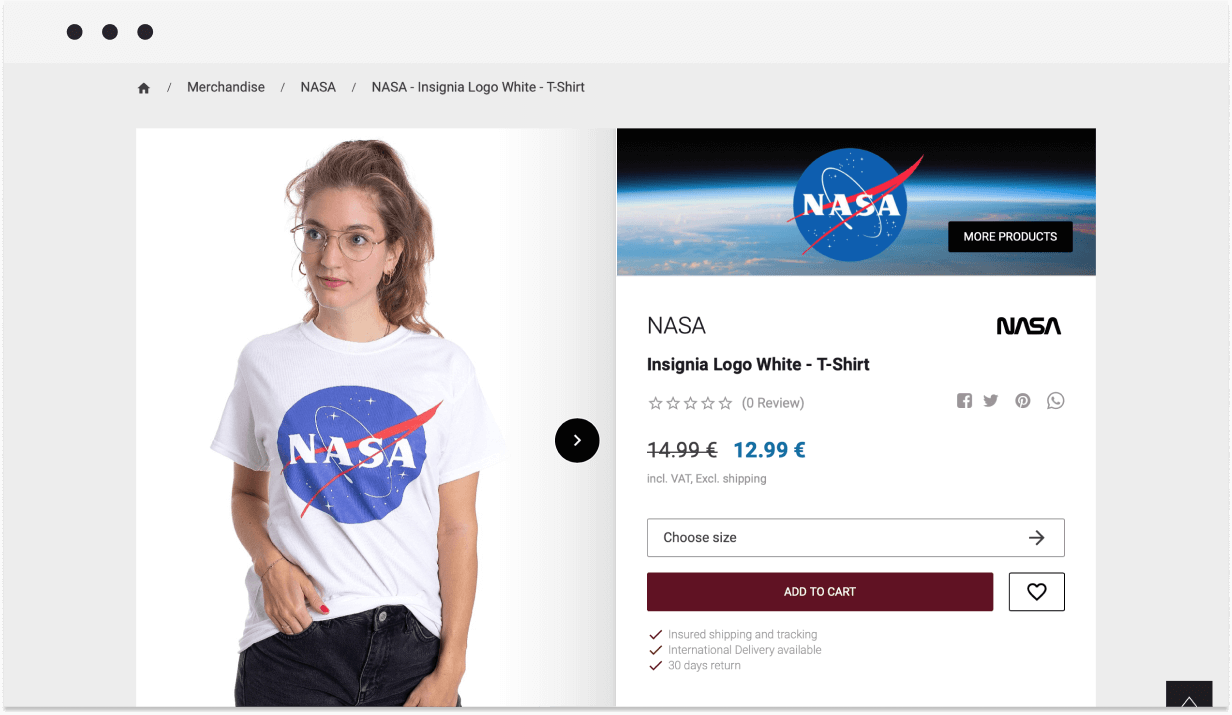
What’s an example of copyright infringement?
We’ve covered cartoon characters, royalty-free images, movie quotes, and logos. Now, let me give you real-life examples of copyright infringement.
As you know, creating t-shirts for sale which feature copyrighted words, works of art, or images isn’t allowed.
But, sadly, this doesn’t stop people from printing and selling t-shirts with copyrighted material, especially when the most that an artist can do is send a DMCA notice.
For example, if you Google “Disney t-shirts”, you’ll find thousands of shirts with Disney characters all over the internet. They’re usually being sold on sites like Amazon, and it’s highly likely that they don’t have permission from Disney to print copyrighted material.
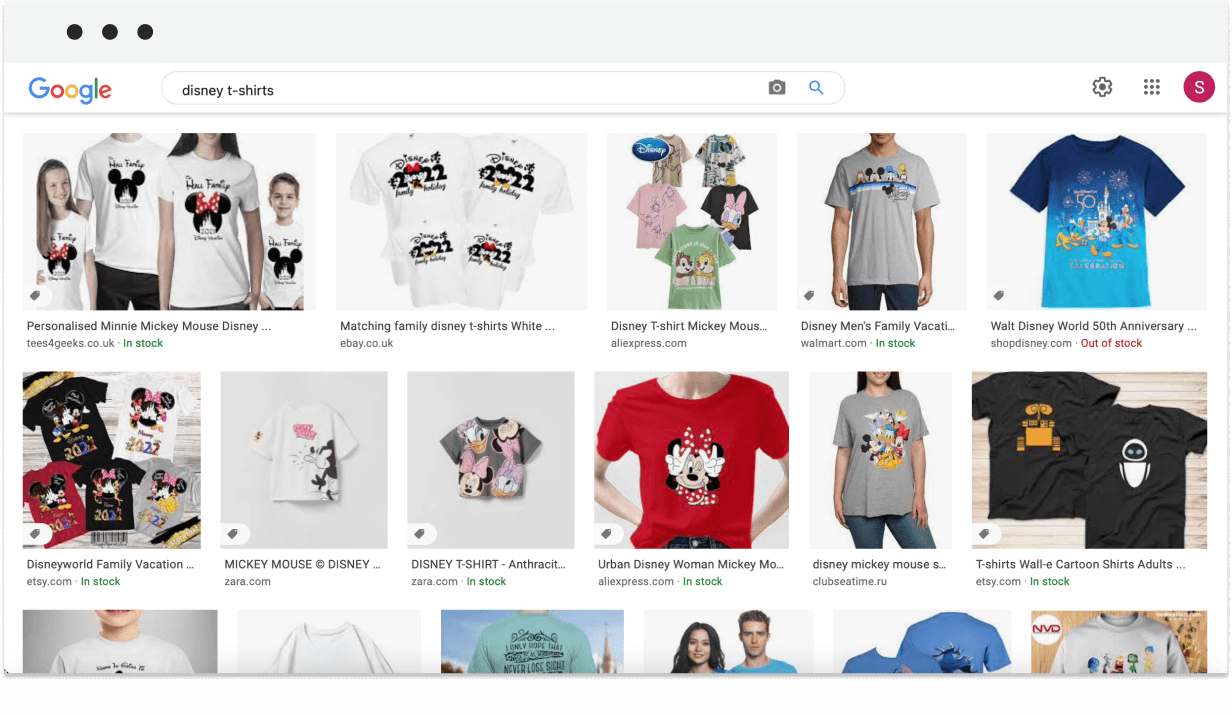
For Disney, suing these sellers is an uphill battle because a lot of them aren’t even located in the US. And, even if they are, there are simply too many of them for Disney to handle.
Another example of widespread copyright infringement is the use of memes on t-shirts. You’d think that a meme would be harmless, but it really isn’t—many of them are based on images created by other people.
And, the only time you’re allowed to use a meme is when you have permission from the original creator of the image.
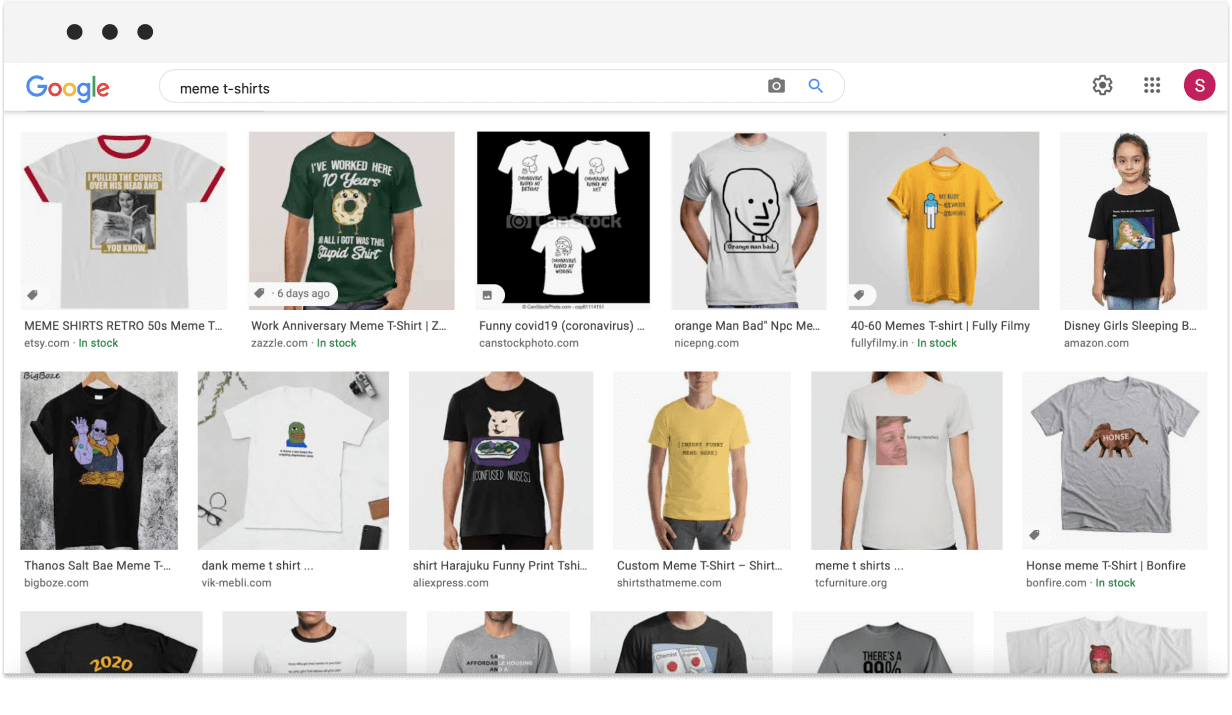
Be safe: 6 bulletproof ways to avoid copyright infringement with t-shirts
If you can’t use logos, cartoon characters, or movie quotes, then what can you use without infringing on copyright? Don’t worry—there are plenty of ways and resources online to help you create custom t-shirt designs without the hassle of copyright infringement. So, let’s get into it!
1. Create your own t-shirt design
Creating your own t-shirt design is probably the safest way to start selling t-shirts and avoiding copyright infringement. And, if that’s something you’re interested in, then there are numerous ways to do that.
For instance, there are free and paid design programs like Inkspace, Adobe Photoshop, and Illustrator that you can use to create your own illustrations, logos, or typography.
Or, if you have an iPad, you can get a highly intuitive design app like Procreate. Then there’s a free t-shirt design platform like Canva, which has thousands of pre-made design templates.
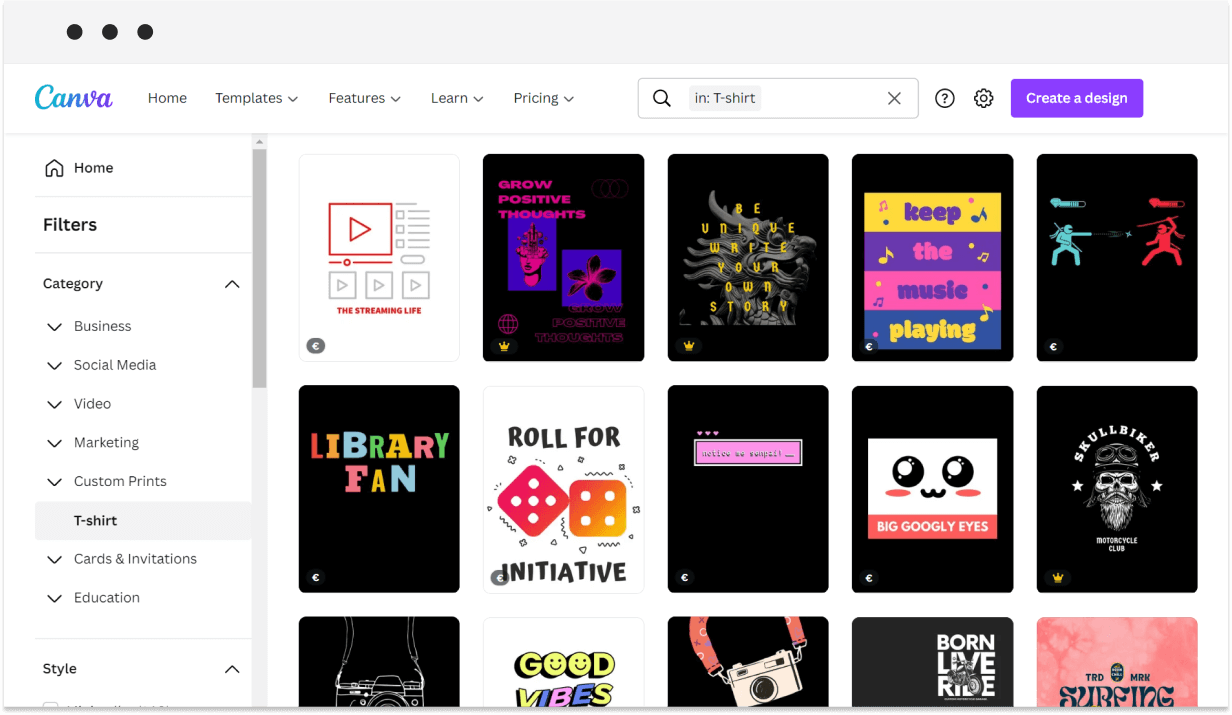
The drawbacks of using some of these programs are the price tag and the steep learning curve. But, on the positive side, Adobe has many helpful tutorials such as this one on how to design a t-shirt.
You may also get some ideas from our article on 21 trending t-shirt designs.
2. Hire a professional graphic designer
Not into playing around with design software? No worries! You can get a freelance graphic designer to help you out.
Good and reliable designers aren’t easy to come by, which is why most creators turn to online marketplaces to find skilled freelancers.
It’s important to work with a designer who thinks like you and understands what you’re looking for.
If you’re unsure about picking just one designer, you can also try working with multiple designers at once by launching a t-shirt design contest on 99designs.
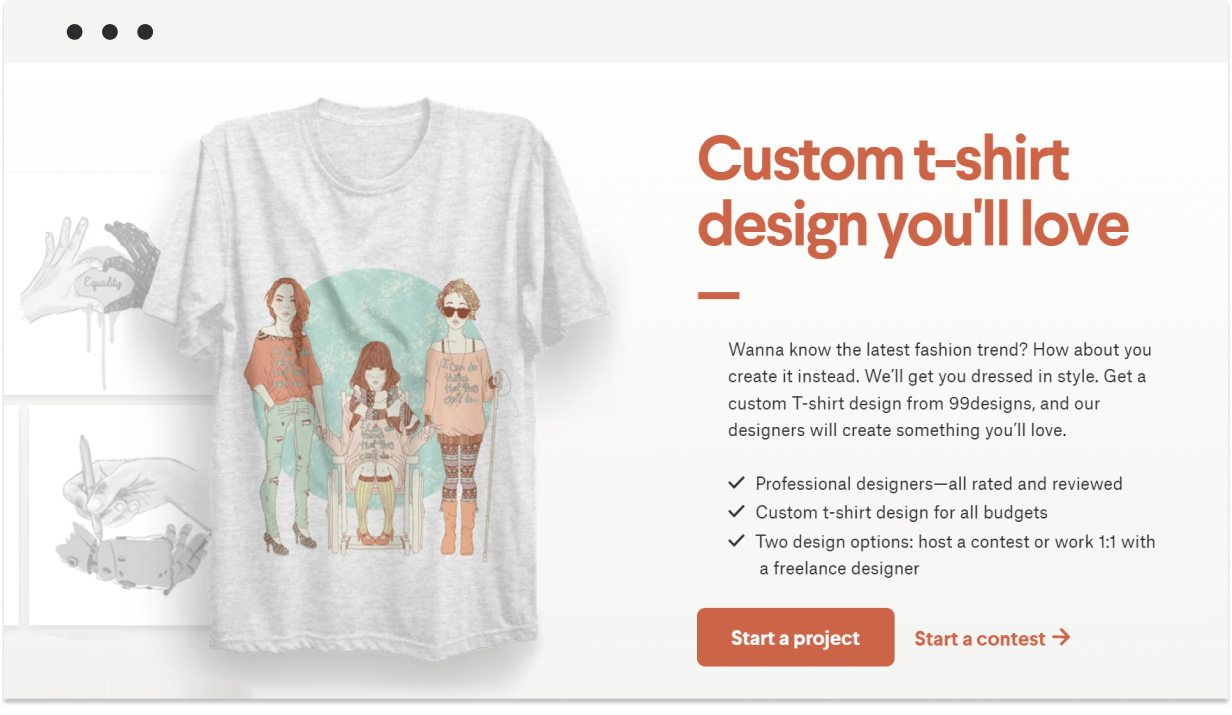
Here’s where to find the best designers for t-shirt designs:
- 99designs—the go-to graphic design site for most merch sellers.
- Upwork—the biggest freelance marketplace for finding talented designers.
- Fiverr—a beginner’s space where you can hire graphic designers for just $5.
- Dribble—a great platform known for having reputable designers.
3. Check if the design is copyrighted
What’s the easiest way to tell whether a design is copyrighted material? See if it has a copyright symbol like “©” or a design watermark. If you see either of these, it’s a dead giveaway that the design is copyright protected.
What if it doesn’t have a copyright symbol or a watermark?
Then check the ownership notes or the author’s description of the original content. Sometimes, owners will mention that their work is copyrighted in the description or on their sales page. If you’re still unsure, you should probably contact the owner and ask.
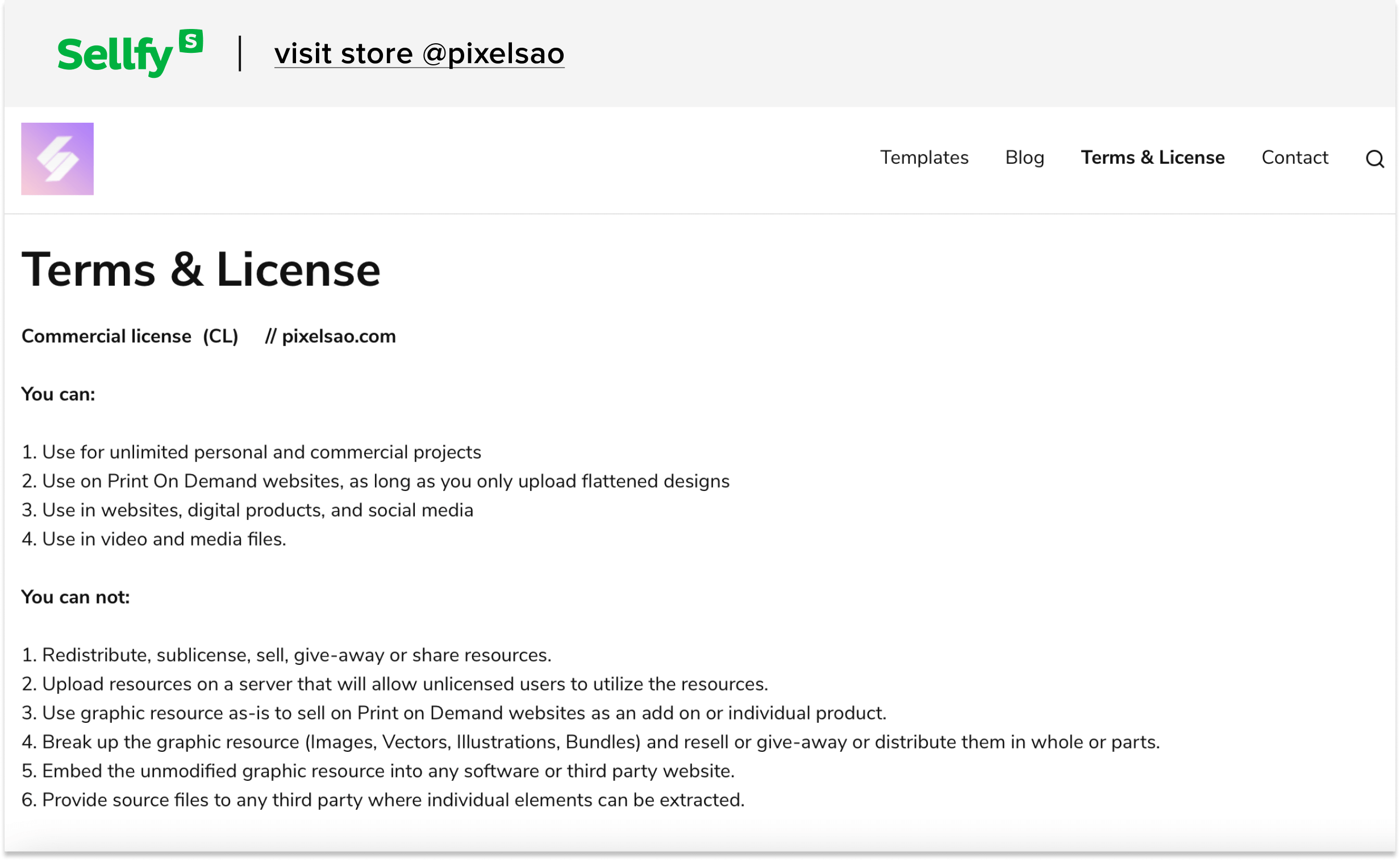
For instance, if a Sellfy creator wants to use trademarked designs with their own print-on-demand t-shirts, they will need to obtain a licensing agreement from the copyright owner and send it to our support team.
A lot of print shops will ask for the same thing, so it’s always a good idea to get written permission from the owner first.
Also, it’s worth keeping in mind that any work that exists in a fixed and tangible form will automatically fall under copyright law.
4. Buy a license for the design
Another way to get licensing rights for t-shirts is to simply purchase a license from the owner. In other words, you pay for the design. Most copyright holders who sell designs will give you different types of licenses to choose from and pay for.
Here are the top sites for finding paid designs:
- Vexels—a site that has vector images for t-shirts and other types of products.
- Creative Market—a large marketplace with over 1,280,000 pre-made vector graphics, fonts, templates, photos, and so much more.
- Placeit—a site that has thousands of mockups and design templates. In addition to their templates, you can also create and purchase t-shirt designs for just $2.95.
- Envato Market—a huge marketplace with over 746,141 fonts, logos, presentations, and other graphic assets from just $2.
Looking for something truly unique? Check out Clint English. This Sellfy store sells high-quality graphic design resources like pre-made artwork, illustrations, fonts, text effects, textures, and even t-shirt mockups.

5. Search for royalty-free or public domain images
Well, this one is kind of a no-brainer—just use royalty-free images or images from the public domain! This is a surefire way to avoid copyright infringement and paying for royalties or license fees.
Here are the top sites for finding free t-shirt designs:
- Unsplash—owned by Getty Images, it’s a site that offers free high-quality stock images that can be inserted into any design.
- Pixabay—a free stock photo and media site for sharing and downloading photos, vectors, illustrations, film footage, and more.
- Pexels—a free stock photo and video sharing community that has millions of royalty-free images and videos.
- Wikimedia Commons—a media repository of videos, sounds, images, and any other type of media.
- Creative Commons—a non-profit organization of different types of photography work offered by owners under Creative Commons licenses.
- Freepik—an image bank of free vectors, high-quality photos, mockups, designs, PSD downloads, illustrations, templates, fonts, and backgrounds.
- Flaticon—resources such as free stickers, vectors, and customizable icons made by designers.
- The British Library—a library of over a million vintage photos such as maps, illustrations, satire, letters, landscapes, wall paintings, etc., for anyone to use, remix, or repurpose.

6. Modify the original design
And, finally, you can modify or change the original design.
As I pointed out at the beginning of this article, this is what is commonly considered fair or transformative use in the United States copyright law. This law allows you to make limited use of the copyrighted design.
The copyright law says:
Fair use of a copyrighted work for purposes such as criticism, comment, news reporting, teaching (including multiple copies for classroom use), scholarship, or research, is not an infringement of copyright.
If you decide to stick to fair use, then there are a couple of rules that you must follow:
- The modification should add something new to the design.
- It can imitate the original design, but not replace the design’s original use.
- It shouldn’t damage the original owner’s creativity and ability to profit from the design.
So, as long as you modify the design enough for it to be considered a different work of art, you’re good to go!
No more worry & stress over copyright laws
I hope you found this article helpful!
Now you know exactly how to avoid copyright infringement with t-shirts. To learn more about running an online business and making money with print-on-demand products, make sure to check out our blog for useful tips and tricks.
Do you have more questions? Sellfy Help Center has answers to the most frequently asked questions, and you’re always welcome to reach out to our support team at [email protected] at any time.






